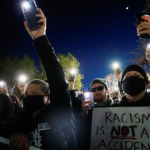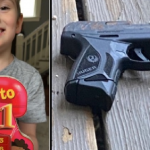A federal judge whose ruling last week to strike down California’s three-decade-old assault weapons ban garnered swift backlash is drawing more criticism over his claims about Covid-19 vaccines, firearm injuries and other subjects.
As the state gears up to appeal U.S. District Judge Roger Benitez’s decision Friday, which California Attorney General Rob Bonta dismissed as “fundamentally flawed,” legal experts say scrutiny of the case goes beyond why he concluded that the state’s prohibition is unconstitutional to another level of concern: how he shaped his argument.
“I think it’s incredibly problematic when a federal judge quotes things that are factually incorrect, because it hurts the integrity of the branch,” said Jessica Levinson, a law professor at Loyola Marymount University in Los Angeles who is an MSNBC columnist.
He wrote that studies prove “that the ‘harm’ of an assault rifle being used in a mass shooting is an infinitesimally rare event,” adding, “More people have died from the Covid-19 vaccine than mass shootings in California.”
Benitez offered no citation for the claim, and his office did not immediately respond to a request for comment Tuesday.
An analysis by Newsweek of the last 80 mass shootings in the U.S. found that 26 percent involved the use of AR-15 rifles.
California has had more than a dozen mass shootings this year, the deadliest of them in May, when a gunman killed nine people at a San Jose rail yard before dying by suicide. NBC News defines a mass shooting as a single incident involving three or more people who have been shot in a public place.
Since 2017, more than 50 people in California have been killed in mass shootings, some of them during a rampage in March at an Orange County business complex, which left a 9-year-old dead, and at a crowded dance hall in 2018 in Thousand Oaks.
The Centers for Disease Control and Prevention has said that while it has investigated nearly 4,900 reports nationwide of deaths among people who received Covid-19 vaccines from Dec. 14 to May 24, physicians were unable to establish a “causal link” to the vaccines. There have been extremely rare cases of potentially life-threatening blood clots involving the Johnson & Johnson vaccine, which led to a temporary pause in its use in April.
Benitez’s ruling last week stems from a 2019 lawsuit filed by James Miller, a California resident, and San Diego County Gun Owners, a political action committee, which alleged that the state’s landmark assault weapons ban — the first of its kind in the country, established in 1989 — violates their Second Amendment rights.
In his decision, Benitez also makes a point about firearm injuries by citing an emergency room physician’s testimony. He wrote that “injuries from firearms like the AR-15 which are banned as ‘assault weapons’ are no different from other firearms that are common and lawful to own.”
The experiences of trauma surgeons who have treated victims of mass shootings involving military-style rifles have been documented in recent years, particularly after the shooting at a high school in Parkland, Florida, in 2018 that left 17 people dead.
“Handgun injuries to the liver are generally survivable unless the bullet hits the main blood supply to the liver,” Sher wrote. “An AR-15 bullet wound to the middle of the liver would cause so much bleeding that the patient would likely never make it to the trauma center to receive our care.”
Constitutional law scholar Laurence Tribe, a professor emeritus at Harvard Law School, said Benitez’s assertions are “utterly without factual foundation.”
“They are irresponsible in the extreme, whether described as purported ‘facts’ or repackaged as opinions,” Tribe said in an email. “His entire theory about which firearms are protected by the Second Amendment has no basis in the text, history, or judicial interpretation of the Amendment and swallows its own tail by making the circular assertion that the weapons in common use at any given time are those protected by the Amendment.”
Benitez was nominated to a seat on the U.S. District Court for the Southern District of California in 2004 by President George W. Bush. His nomination was overwhelmingly opposed by a committee of the American Bar Association, which said other judges and lawyers interviewed about him described him as being arrogant, short-tempered and “altogether lacking in people skills.”
A committee member told senators that Benitez’s response was “to consistently deny the accuracy of what I had been told,” adding, “He was unable to explain why so many people would make incorrect, negative comments about him.”
The Senate confirmed his nomination 98-1.
In recent years, Benitez, who is based in San Diego but whose rulings could reverberate through several Western states under the jurisdiction of the 9th U.S. Circuit Court of Appeals, has overseen a number of high-profile gun-related cases. He has opposed California’s ban on high-capacity magazines and its mandatory background checks to buy ammunition in colorful, strongly worded rulings. He has written that the Second Amendment “gets even less respect” than Rodney Dangerfield, a nod to the late comedian’s shtick.
Josh Blackman, a law professor at South Texas College of Law Houston and an adjunct scholar at the Cato Institute, a libertarian think tank, said that while Benitez writes with “flair” in his rulings, he is ultimately not violating any ethics rules.
He added that the underlying basis for Benitez’s ruling — that assault weapons are “fairly ordinary, popular, modern rifles” that are not routinely used in mass shootings and that, therefore, their use should be protected by the Second Amendment — is made clear.
It’s not unheard of, Blackman added, for judges deciding hot-button issues, such as cases involving voting rights and abortion, to use flourishes in their opinions that depart from more straightforward legalese.
Benitez stayed his order for 30 days to give the state a chance to appeal to the 9th Circuit.
Observers say the case could land before the Supreme Court, which agreed in April to take up a challenge to New York’s concealed handgun law — the first time in more than a decade that the high court will hear a central issue of the gun rights debate.
Levinson said the potential unraveling of California’s assault weapons ban shows how federal judicial appointments, which are lifelong, can having lasting effects on many issues.
“This should be a lesson to us all. It really matters who’s on the federal bench,” she said.



